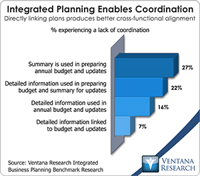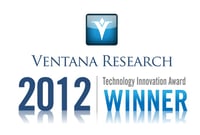Tidemark announced the release of the Fall 2013 version of its eponymous cloud-based application that my colleague assessed earlier in 2013. This new release adds capabilities for labor planning and expense management as well profitability modeling and analysis. These two areas of planning and analysis are common to all businesses. The new release adds features that enhance the software’s ability to do sales forecasting, initiative planning and IT department planning. The company continues to...
Read More
Topics:
Big Data,
Performance Management,
Planning,
Predictive Analytics,
Sales Performance,
Supply Chain Performance,
Office of Finance,
Reporting,
Controller,
Operational Performance,
Analytics,
Business Performance,
Cloud Computing,
Customer & Contact Center,
Financial Performance,
In-memory,
Workforce Performance,
CFO,
Tidemark,
Financial Performance Management,
financial reporting,
FPM,
Integrated Business Planning
Organizations succeed through continuous planning to achieve high levels of performance. For most organizations planning is not an easy process to conduct. Planning software is typically designed for only a few people in the process, such as analysts, or organizations might use spreadsheets, which are not designed for business planning across an organization. Most technologies only allow you to examine the past and not plan for the future. For decades organizations have tried to focus planning...
Read More
Topics:
Big Data,
Sales Performance,
Supply Chain Performance,
Mobile Technology,
Operations,
Operational Performance,
Business Analytics,
Business Collaboration,
Business Intelligence,
Business Performance,
Cloud Computing,
Cloudera,
Customer & Contact Center,
Financial Performance,
Governance, Risk & Compliance (GRC),
Information Applications,
Workforce Performance,
Business Planning,
CFO,
finance,
Tidemark,
Workday
Business software is beginning to undergo a design revolution comparable to the seismic shift from the green screen to the graphical user interface (GUI) that began in the mid-1980s. Three forces are at work. One is the retirement of large numbers of members of the baby-boom generation and the rise of a generation that grew up with computers and computer games from a young age. Also, software and technology vendors have been recognizing the need to “consumerize” business applications as mobile...
Read More
Topics:
Big Data,
Sales Performance,
Salesforce.com,
Supply Chain Performance,
OpenWorld,
Operational Performance,
Business Performance,
Cloud Computing,
Customer & Contact Center,
Financial Performance,
Oracle,
Workforce Performance,
Dreamforce,
finance,
Tidemark,
Business,
design,
development,
GUI
I recently got an update from Workday that focused mostly on its Financials software. This part of the company’s business management suite has received less development attention than the HR aspects since the company’s founding in 2005. The bulk of Workday’s development investment has aimed at making its human capital management applications an industry leader and adding related capabilities such as payroll. It’s hard to argue against this strategy, if only because Workday is the spiritual...
Read More
Topics:
ERP,
Office of Finance,
expense management,
financial,
PSA,
Operational Performance,
Analytics,
Business Analytics,
Business Mobility,
Business Performance,
Cloud Computing,
Financial Performance,
Oracle,
Workforce Performance,
Infor,
Tidemark,
Workday,
Professional Services,
Project Management
As Workday held its annual Workday Rising conference this week, it’s a good time to note the accomplishments of the company and to provide a fair and balanced coverage that has yet to be spoken by my industry peers for some reason. Co-founder and co-CEO David Duffield, who founded PeopleSoft, champions a set of core values in its culture and leads a workforce that has built a new generation of ERP applications for deployment in the cloud computing environment. The suite brings together human...
Read More
Topics:
SAP,
Human Capital Management,
Kronos,
NetSuite,
Recruiting,
Zuora,
Operational Performance,
Business Analytics,
Business Collaboration,
Business Mobility,
Business Performance,
Cloud Computing,
Financial Performance,
Oracle,
Workforce Performance,
Cornerstone OnDemand,
Digital Interviewing,
Hiring,
HRMS,
Saba,
SumTotal Systems,
Talent Management,
Taleo,
Tidemark,
Workday,
Workforce Analytics










